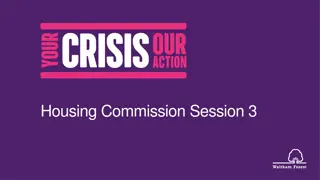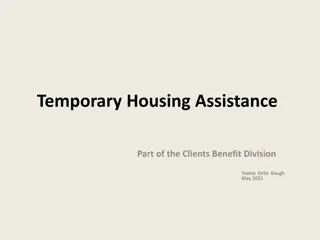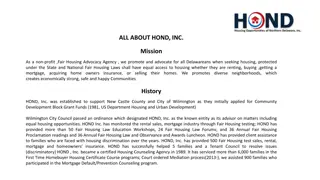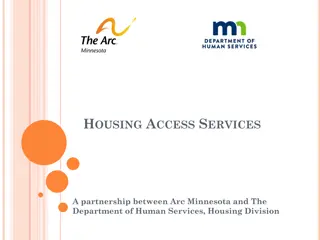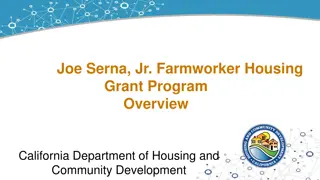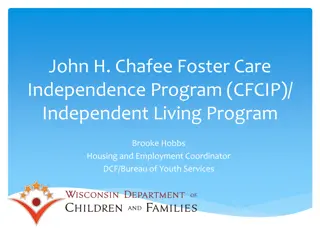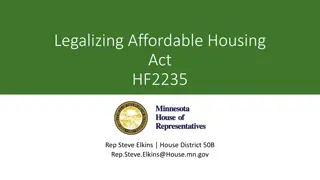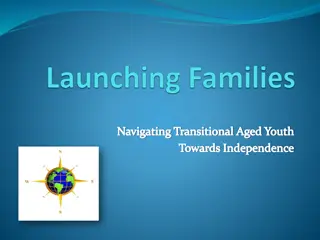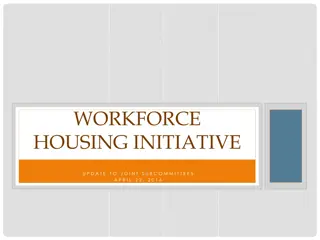Understanding Housing Options for Transition Age Youth in Foster Care
Explore the resources and housing options available for transition age youth (TAY) in foster care, focusing on individuals aged 18-24. Learn about extended foster care benefits, eligibility criteria, terminology, and housing programs for non-minor dependents (NMDs). Gain insights into rights, responsibilities, and support for young adults navigating housing challenges.
Download Presentation

Please find below an Image/Link to download the presentation.
The content on the website is provided AS IS for your information and personal use only. It may not be sold, licensed, or shared on other websites without obtaining consent from the author. Download presentation by click this link. If you encounter any issues during the download, it is possible that the publisher has removed the file from their server.
E N D
Presentation Transcript
Logistics Webinar resources, including recording and supplemental materials, will be posted at https://allianceforchildrensrights.org/resources/ All attendees are muted during webinar. Please submit questions using the Questions function on your GotoWebinar dashboard.
Presenters Alero Egbe, Esq. Attorney, Sullivan and Cromwell Fellowship Children s Rights Project Christine Bradshaw, Esq. Staff Attorney
OVERVIEW OF HOUSING OPTIONS
Agenda Housing options for transition age youth who are currently or formerly in foster care ages 18-24 General rights and responsibilities transition age youth have in their housing placements Resources for young adults and advocates navigating housing issues
Terminology: TAY v. EFC/AB12/NMD TAY = Transition Age Youth (ages 16-24, current and former youth in foster care) EFC = Extended Foster Care = Assembly Bill 12 (AB12 which extended foster care eligibility from age 18 to age 21 in California) NMD = Non Minor Dependent (ages 18-21, youth currently in foster care)
Public Counsel Extended Foster Care (EFC) Youth participating in EFC are eligible for: Monthly benefits Housing Support transitioning to adulthood To be eligible for EFC, youth must: Be 18-21 years old Have an open dependency (foster care) court case Satisfy one of the participation requirements by being in school, working at least 80 hours/month, working on removing barriers to employment, or be unable to do one of the other requirements due to a medical or mental health condition Meet monthly with social worker or probation officer Live in an approved setting Have a Transitional Independent Living Plan (TILP)
Housing Options for NMDs For official placement: Supervised Independent Living Placement (SILP) Transitional Housing Placement Program for Nonminor Dependents (THPP-NMD) Short-Term Residential Therapeutic Program (STRTP, formerly group homes) Resource Family Homes (formerly known as foster homes) Includes approved relatives and family friends Dual Agency Regional Center Homes (only for Regional Center consumers) For emergencies: Transitional Living Settings (TLS)
9 SILP Overview Supervised Independent Living Placement (SILP) is a placement option for NMDs ready for greater independence Youth find their own apartment/dorm/room to rent DCFS must approve the housing for youth to get funding Youth receive $1,206 per month in foster care funding Plus Infant Supplement if parenting ($900 per month per child) Plus parenting supporting supplement if youth and an older adult enter into an agreement for the older adult to mentor the youth in becoming a parent ($200 per month)
10 How Does SILP Get Approved? Two step process to approve a SILP DCFS assesses youth s readiness to live in a SILP youth s ability to budget, do laundry, cook food, and demonstrate other life skills DCFS conducts a health and safety inspection of the physical space Dorms and other college housing are automatically approved
Other Tips Regarding SILPs Youth need to plan ahead., It takes about 6 to 8 weeks from the date of location approval for the first SILP check to arrive. The checks will cover back to the date that the place was officially approved. Every month the checks will be sent on the 15th of the month to pay for the previous month. (i.e., August s check is sent on September 15) Youth typically don t have good credit, or make enough to prove they can pay the rent every month, or have a co-signer, or have enough saved up to pay the security deposit. SILP Plus A temporary source of DCFS funding that can help pay for move in expenses, security deposit, first month rent, etc.
Transitional Housing for Youth in Extended Foster Care (THPP-NMD) An apartment with supportive services for youth ages 18-21 Youth generally get a stipend (of roughly $500-600 per month) and parenting youth also get an Infant Supplement (of $ 900 per month per child) Must apply and be accepted into program Must follow terms of program agreement
Transitional Living Settings (TLS) Transitional living settings are short-term housing placements during entry or re-entry into extended foster care or during transitions between placements. Because they are intended to be short-term, they do not have as stringent of requirements as SILP or the licensing requirements of THPs. Can be a friend or family s home, a shared room or a couch, hotel, Airbnb, church, a youth resource center, or other alternative housing options However shelters (adult homeless shelters, youth homelessness prevention centers, and similar placements) are NOT appropriate for youth and thus not eligible for TLS funding.
Housing Options for Youth Formerly in Foster Care Transitional Housing Program Plus (THP-Plus) www.ilponline.org/Housing/THPPLUS Independent Living Program Transitional Housing Program (ILP-THP) www.ilponline.org/Housing/ILPTHP Find an apartment to rent using FYI/FUP (Section 8) vouchers
Transitional Housing Program - Plus (THP+) Housing with supportive services for youth ages 18-24 Similar to THPP-NMD, but for youth NO LONGER in foster care Must have been in foster care on or after age 18 Must apply and be accepted into program Can stay for up to 36 months Youth usually get a stipend Roommate often required Must agree to follow program agreement Contact ILP Coordinator to apply https://www.ilponline.org/ContactILP/
Independent Living Program- Transitional Housing Program (ILP-THP) Housing with supportive services for youth NO LONGER in foster care ages 18-21 Participant must apply and be accepted into program Must be ILP eligible https://ilponline.org/Eligibility/ Participant must agree to follow program agreement, maintain at least weekly contact with case manager, and participate in life skills training Often requires roommate Contact ILP Coordinator to apply https://www.ilponline.org/ContactILP/
FYI/FUP Vouchers Foster Youth to Independence (FYI) program and Family Unification Program (FUP) vouchers are designed to ease the transition to adulthood and independence. Administered by the federal Department of Housing and Urban Development (HUD), along with local public housing authorities working in partnership with local child welfare agencies. These vouchers are available for up to 36 months. They cover a portion of the rent. Eligibility: 18-24 years old (can use voucher past age 25 as long as young adult is 24 at time of contract execution/child welfare agency certification) Homeless or at risk of homelessness at age 16 or older Have aged out of FC or will soon (within 90 days)
Applying for FYI/FUP Vouchers Which program to apply to? If still in foster care apply for FYI If leaving or left foster care apply for either If you have a family (child, live-in partner) FUP only To get an FYI voucher, young adults can send request to local child welfare agency (DCFS, ILP coordinator, Probation Dept.), asking them to make a referral to the public housing authority for a voucher.
Responsibilities in Housing Pay rent on time (if required to pay rent) Keep unit in good repair and pay for any damage Follow the rules in the lease and/or program agreement (e.g., pets, smoking, overnight guests, parking) Respect other tenants rights (e.g., keep noise down, do not block hallways, do not leave security gates open)
RIGHTS IN HOUSING
Key Housing Rights Many youth have tenants rights. In addition, we will discuss: NMDs specific right to an appropriate placement Protection from unlawful housing discrimination Right to safe, adequate, sanitary housing Right to request a request a reasonable accommodation for a disability Right to proper written notice before a youth has to leave their housing
Rights Specific to NMDs NMDs in foster care have a right to an appropriate placement at all times. A shelter is not an appropriate placement. It must meet the youth s individualized needs Not every placement has to serve every youth but every youth has to have a placement. All County Letter: ACL 19-105
Federal and State Protection from Discrimination Housing providers and landlords cannot deny housing, evict someone, or harass someone based on a protected status including: Race Marital status, familial status or pregnancy Color Disability or medical condition Religion National origin Age Ancestry Source of income Sex, gender, gender identity, gender expression Genetic information Citizenship, primary language, or immigration status Sexual orientation Cal. Gov. Code 12955-12957 and Cal. Civ. Code 51, 51.7, and 54-55.2
Renters Right to Safe & Adequate Housing Anyone who has an agreement to temporarily stay someplace has a right to a habitable place, which includes: Unit has basic safety features (no broken windows or doors, effective waterproofing) Plumbing, electricity, gas, and water work Building and grounds are clean and sanitary (no rodents, roach infestation, or mold growing on walls) California Civil Code 1941.1 and California Health and Safety Codes 17920.10 and 17920.30
Right to a Reasonable Accommodation for a Disability Can request reasonable accommodations at any time from the housing provider, the landlord, or both. Can request changes to rules, policies, practices, or services that are necessary for equal opportunity to use and enjoy the housing Youth have to request a reasonable accommodation the landlord/provider doesn t have to give one unless it is requested. Fair Employment and Housing Act Articles 16-17, 12176-12177 and Fair Housing Act 3602
Reasonable Accommodations contd. The requested accommodation must help address the disability: John has difficulty walking due to his disability. He requests a reserved parking space near his unit so he won t have to walk far from his car to his apartment after work. Reasonable accommodation? Instead of asking for reserved parking, John asks his landlord to reduce John s rent by 25% for the next six months. Reasonable accommodation?
Sample Reasonable Accommodations Giving early notice to a tenant with chemical allergies that the apartment will be painted Assisting an applicant who has a developmental disability with completing their application Reserving a parking space close to the building for a tenant with a mobility impairment Having live-in aide Using a sign language interpreter or documents in an accessible format Modifying existing premises to allow full use and enjoyment of the premises (like putting in a ramp to allow a wheelchair to go up a stair to another room in the apartment) Asking for help to meet program requirements (like help working out issues with roommates)
Requesting Reasonable Accommodation In writing, a youth should: 1. Identify as a person with a disability (there is no need to say what the disability is), 2. State the requested accommodation/modification, 3. Explain how the request is directly related to the disability, and 4. Provide a deadline and a way to respond (give a reasonable time period). The landlord/provider must engage in an interactive process around the youth s request.
Emotional Support Animals (ESAs) Prescribed by a licensed mental health professional to a person with a disabling mental illness Ensure the ability to function normally on a daily basis Provide emotional, cognitive or similar support to assist in managing the symptoms of a disability Most commonly, emotional support animals ease depression, anxiety, or certain phobias They are NOT service animals, because they are not trained to perform specific tasks to assist someone with a disability.
ESA Documentation If disability is not readily apparent, a housing provider can ask for documentation to support the request to have an ESA. Do not have to disclose the disability ESAs do not have to be registered. A vest, ID cards, tags, or similar equipment are not proof of the need for an ESA. Best documentation: a receipt of disability benefits letter or a letter from a health care provider CA Law was updated in 2022 most significant change is that health care providers providing an ESA letter must have a client-provider relationship at least 30 days before providing the documentation.
Getting an ESA Approved Can be requested at any point in the housing search process and at any point while a resident. Can have an animal where otherwise the landlord/housing provider normally allows no animals or has a breed/size/type limitation Landlord cannot charge fees they normally would charge, such as a pet deposit or pet rent However, ESAs can be denied for the same reason other reasonable accommodations can be denied. https://calcivilrights.ca.gov/wp-content/uploads/sites/32/2022/12/Emotional-Support-Animals-and- Fair-Housing-Law-FAQ_ENG.pdf
Getting ESA Approved contd. Reyna s doctor told her that an emotional support dog would help her depression. Reyna s cousin needs to give away his dog Bandit because Bandit bit some of the neighbors kids, causing one child to need stitches. Reyna wants Bandit to be her emotional support dog, but her apartment building has several families with small children living there. Will this ESA be approved?
Right to Proper Notice Before Any Discharge/Eviction Landlord must give you written notice before asking tenant to move out 3-Day Notice For failure to pay rent, failure to fix a problem, or a serious lease violation 30-day Notice To end a month-to-month lease if tenant has been there less than a year 60-Day Notice If tenant has been there more than a year
Youth in THPs? Try to resolve the issue with THP staff Keep copies of all correspondence received from the provider/landlord Call the Family Urgent Response System: 1-833-939-3877 Seek legal help as soon as you get any type of verbal or written notice that you are being told to move out Public Counsel: 213-385-2977, x500 Alliance for Children s Rights: 213-368-6010 If you are currently in foster care, call your attorney at the Juvenile Public Defender s Office (213-974-2828) or at Children s Law Center (323-980-1700) for help
If Youth Is Being Pushed Out CALL Public Counsel. STAY in housing as much as possible. DO NOT sign anything. WRITE down everything that happens. CONTACT your foster care attorney/Public Defender. REQUEST a Child and Family Team Meeting (CFT). REACH OUT to the housing provider and ask for more time. ASK the foster care attorney about going before a judge.
Community Care Licensing Complaint Anyone can file a complaint with CDSS Community Care Licensing Division if a THP agency has violated state laws and regulations. File a complaint (ca.gov) Substantiated complaints result in a citation, with a time period given for the program to correct the violation. Consequences vary depending on the violation. Review any previous complaints here: Social Services - Community Care Facility search. Repeat violations may lead to more serious consequences.
Sample Substantiated CCL Violations Unsafe, unhealthy, and uncomfortable homes: non-working appliances, delayed repairs, mold, rodent or insect infestations, no cribs for parenting young adults Inappropriate conduct by program staff Unreasonable searches and/or failures to guard personal items Improper management of participants cash resources Discharge with improper or missing notice Failure to pay bills, including rent and utilities, in a timely manner Failure to change case manager after youth report feeling uncomfortable with current case manager
If Youth Was Pushed Out Based on Protected Status Make a complaint to the California Civil Rights Department: Complaint Process | CRD (ca.gov) File with Equal Employment Opportunity Commission A CRD complaint can be the preferable option because CCRD will dual file with EEOC, and there are more state than federal protections.
Youth with Private Landlords? If the youth paid rent, the youth has tenant rights. If living in LA County and served with an unlawful detainer (eviction) notice, contact Stay Housed LA at https://www.stayhousedla.org/referral/ or call 1-888-694-0040 for legal assistance Seek help right away if you receive a notice from your landlord If living in LA County and have questions about housing rights, contact the Housing Rights Center at 1-800-477-5977 Experienced unlawful housing discrimination? Make a complaint with the California Department of Fair Employment and Housing at https://www.dfeh.ca.gov/ComplaintProcess/ or by calling 800-884-1684
Webinar resources, including recording and supplemental materials, will be posted at https://allianceforchildrensrights.org/ resources/ @allianceforchildrensrights THANK YOU S T A Y C O N N E C T E D allianceforchildrensrights.org






